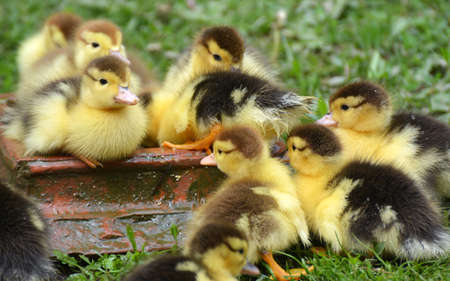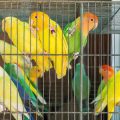Introduction to Pet Birds in the UK
Keeping pet birds has long been a cherished tradition among families across the United Kingdom. The gentle chirping of budgies or the vibrant colours of parrots bring life and joy into many British homes, making birds one of the most popular pet choices nationwide. UK households often select pet birds for their manageable size, engaging personalities, and the unique companionship they offer. Unlike larger pets such as dogs or cats, birds require less space, making them ideal for flats and smaller homes commonly found in urban areas. Culturally, British families appreciate the daily routines and responsibilities that come with caring for a bird—feeding, cleaning, and social interaction—which can teach children important values such as empathy and discipline. Below is an overview of why pet birds are so appealing within typical UK household environments:
| Appeal Factor | Description |
|---|---|
| Space Efficiency | Birds fit comfortably in both houses and flats, requiring minimal space. |
| Low Maintenance | Compared to other pets, birds need less grooming and outdoor exercise. |
| Educational Value | Caring for birds helps children learn responsibility and routine. |
| Social Companionship | Birds interact with their owners through singing, mimicking speech, and playful behaviour. |
| Cultural Acceptance | Bird keeping is widely accepted and appreciated in British society. |
The popularity of pet birds in the UK reflects not only practical considerations but also deep-rooted cultural attitudes towards animal companionship. This enduring fondness ensures that pet birds continue to be an integral part of family life throughout Britain.
2. Budgerigars: The Cheerful Choice
Budgerigars, affectionately known as “budgies,” are among the most popular pet birds in the UK, capturing the hearts of families up and down the country. Their popularity can be attributed to a unique combination of traits that perfectly suit British households and lifestyles.
Why Budgies Are Loved in British Homes
Budgies are renowned for their friendly and social nature. They thrive on interaction, enjoy mimicking sounds, and can even learn to say a few words with regular training. Their bright plumage and playful antics bring cheerfulness and energy into any home, making them especially appealing to families with children or those seeking lively companionship.
Key Reasons Budgies Fit UK Lifestyles
| Feature | Benefit for UK Families |
|---|---|
| Compact Size | Ideal for homes and flats with limited space |
| Low Maintenance | Easy daily care fits busy British routines |
| Affectionate Temperament | Great companions for both adults and children |
| Adaptable | Suits both solo owners and active family environments |
Caring for Budgies: Simple Yet Rewarding
Budgies require minimal equipment—a suitably sized cage, fresh water, seed mix, occasional fruit or veg, and a few toys for enrichment. Their low-maintenance needs make them ideal for first-time bird owners across the UK. With regular attention and gentle handling, budgies quickly become trusting members of the household, providing joy without demanding extensive time or resources.

3. Cockatiels: Friendly Companions
Cockatiels are among the most cherished pet birds in the UK, and it’s no surprise why they’re a favourite for families. These charming parrots are known for their gentle nature and ability to bond closely with their human companions. In many British households, cockatiels are chosen not only for their delightful appearance but also for their suitability as family pets.
Why Cockatiels Are Popular in UK Homes
British families appreciate cockatiels for their affectionate personalities and relatively low maintenance compared to larger parrots. They adapt well to the indoor environments typical of UK homes and can thrive even in smaller flats or terraced houses. Their playful antics and ability to mimic simple tunes make them especially popular with children and adults alike.
Suitability for Families
| Factor | Cockatiel Suitability |
|---|---|
| Temperament | Gentle, friendly, rarely aggressive |
| Noise Level | Generally quiet; occasional whistles and chirps |
| Space Required | Comfortable in medium-sized cages; fits most UK homes |
| Interaction Needs | Loves daily interaction, ideal for sociable families |
Daily Care Tips Reflecting UK Routines
- Feeding: A balanced diet of high-quality seed mix, fresh vegetables (like carrots and broccoli), and occasional fruits. Always provide clean, fresh water—tap water is safe in most parts of the UK.
- Cage Cleaning: Clean the cage base every other day and do a thorough clean weekly. This matches well with common UK household cleaning routines.
- Exercise: Allow your cockatiel supervised out-of-cage time daily. If you have a conservatory or secure living room, this is perfect for them to stretch their wings.
- Sociability: Spend time talking or whistling to your cockatiel each day, ideally during breakfast or after school/work hours when the household is busiest.
Cockatiels are truly friendly companions, bringing joy to homes across the UK. Their adaptability, affectionate nature, and straightforward care requirements make them an excellent choice for both first-time bird owners and experienced avian enthusiasts alike.
4. Canaries and Finches: The Songbirds
Among the most cherished pet birds in UK homes, canaries and finches are especially prized for their delightful songs and lively personalities. These small songbirds have been a staple in British households for generations, celebrated for their ability to bring a touch of nature’s melody indoors. Their popularity is not just rooted in their vocal talents but also in their manageable care needs and vibrant appearance.
Why UK Families Choose Canaries and Finches
| Reason | Description |
|---|---|
| Melodic Songs | Canaries are famous for their enchanting tunes, often filling the home with gentle, soothing music. Finches, particularly zebra and Bengalese varieties, contribute cheerful chirping that adds to a lively atmosphere. |
| Low Maintenance | These birds require less hands-on interaction compared to parrots or budgies, making them ideal for busy families or those new to birdkeeping. |
| Bright Personalities | Despite their small size, canaries and finches are active and curious, providing endless entertainment as they flit about their cages. |
| Aesthetic Appeal | With vivid plumage ranging from sunny yellows to deep reds and striking patterns, these birds make visually stunning companions. |
Cultural Significance in the UK
The tradition of keeping canaries dates back to Victorian times when they were prized not only for their song but also as status symbols. Today, both canaries and finches remain popular choices due to their nostalgic charm and adaptability to modern living spaces. In many British homes, it’s common to find a dedicated cage in the conservatory or lounge where these songbirds can be enjoyed by all family members.
Tips for Keeping Songbirds Happy
- Provide a spacious cage with plenty of perches and safe toys.
- Ensure access to natural light or full-spectrum lighting to maintain healthy singing habits.
- Offer a varied diet including seeds, fresh greens, and occasional fruit treats.
Ultimately, canaries and finches hold a special place in UK culture as beloved pets that brighten homes with both sound and colour. Their easy-going nature and beautiful melodies continue to win the hearts of families across the country.
5. Parrots: Colourful Characters
Parrots are among the most vibrant and intelligent pet birds found in UK households. While smaller species like budgies and cockatiels are more common, many British families are drawn to larger parrots such as African Greys, Amazons, and Macaws for their impressive personalities and talking abilities. However, keeping a large parrot requires careful consideration, especially given the unique environment of the UK.
Understanding Larger Parrots
Larger parrots are known for their long lifespan—often 30 years or more—and strong social needs. They thrive on interaction, mental stimulation, and a varied diet. Their intelligence means they can learn tricks and even mimic human speech, but it also means they require daily enrichment to prevent boredom and related behavioural issues.
Unique Needs of Large Parrots
| Requirement | Description | UK-Specific Consideration |
|---|---|---|
| Cage Size | Spacious cage allowing flight and exercise | UK homes may have limited space; ensure cage fits comfortably without restricting bird movement |
| Diet | Varied diet including pellets, fresh fruit & veg | Some tropical fruits may be expensive or less available; choose local alternatives where possible |
| Social Interaction | Daily human engagement, toys & puzzles | Short winter days mean more indoor time; invest in stimulating activities |
| Noise Level | Loud vocalisations, especially at dawn/dusk | Semi-detached or terraced housing may require extra soundproofing or consideration for neighbours |
Weather and Housing Considerations
The UKs cooler climate and frequent damp weather can pose challenges for large parrots originally from tropical regions. It is essential to maintain a stable indoor temperature (ideally 18–22°C) and avoid draughts. Humidity levels should be monitored during dry winters to prevent respiratory issues. If taking your parrot outdoors in summer, provide shaded areas and never leave them exposed to direct sunlight or sudden chills.
Key Takeaways for UK Families:
- Choose a suitable location for the cage away from radiators and windows.
- Monitor room temperature and humidity year-round.
- Invest time in training and socialising your parrot daily.
- Be mindful of noise levels out of respect for neighbours.
Caring for large parrots in the UK is rewarding but demands commitment. With proper planning around home layout, local climate, and lifestyle, these colourful characters can become much-loved members of any family.
6. Practical Advice for Potential Owners
Choosing a pet bird is an exciting decision, but it comes with important responsibilities. Here are some essential, UK-specific tips to ensure you provide the best care for your feathered companion.
Choosing the Right Bird
Consider your household’s daily routine, space, and experience level. For families new to birds, budgies or cockatiels are ideal due to their sociable nature and manageable care requirements. If you have more time and experience, conures or African Grey Parrots might suit you.
| Bird Species | Suitable For | Lifespan (Years) | Noise Level |
|---|---|---|---|
| Budgerigar | Beginners, Children | 5-10 | Low |
| Cockatiel | Families, Beginners | 15-20 | Moderate |
| African Grey Parrot | Experienced Owners | 40-60+ | High |
| Conure | Active Families | 15-25 | High |
| Zebra Finch | Busy Households, Beginners | 5-7 | Low |
| Canary | Seniors, Quiet Homes | 8-12 | Low-Moderate (singing) |
Caring for Your Pet Bird in the UK Climate
- Cage Placement: Keep cages away from draughts and direct sunlight. UK homes can get chilly; avoid placing the cage near windows during winter.
- Bedding and Cleaning: Use safe materials such as paper-based bedding. Clean the cage weekly to prevent mould and odours.
Diet and Enrichment Tips
- Diverse Diet: Offer a mix of high-quality seed or pellet blends, fresh vegetables (like carrots and broccoli), and fruit in moderation. Avoid avocado and chocolate as they are toxic to birds.
- Toys & Socialisation: Provide safe toys made for birds and allow out-of-cage time when possible. Social birds thrive on interaction—spend time talking or whistling to them daily.
Legal and Ethical Considerations in the UK
- Wildlife Laws: Some birds (like certain parrots) may require documentation under CITES regulations. Always buy from reputable breeders or rescue centres.
- Animal Welfare: The Animal Welfare Act 2006 protects all pets in the UK. Ensure your bird has adequate food, water, shelter, medical care, and enrichment.
Your Local Avian Vet and Support Resources
If you’re unsure about any aspect of care, consult a local avian vet or connect with organisations like the RSPCA or The Parrot Society UK for advice.
By considering these practical tips tailored for UK families, you’ll help your pet bird live a long, happy life as part of your household.


